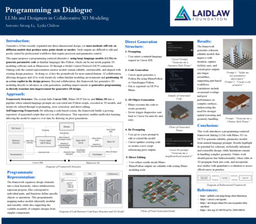While all Laidlaw Scholars will be presenting their research at the Columbia Undergraduate Research Symposium in the fall, what are the more immediate expectations that you have for your research? Are you writing a paper? Will your research be part of a larger scientific study? Do you hope to produce an annotated bibliography that you reflect on down the line? Is your research now the first phase of a project you’ll continue to work on throughout the year, and/or next summer? Now that we are nearing the one month mark of the program, please write about your expectations for your research.
While I will be writing a paper, the primary goal of my project is to develop an algorithm that can be genuinely useful for architects and homeowners, especially those looking to renovate or design custom additions. During my time at Laidlaw so far, I have built a preliminary framework for using AI to generate complex, context-aware housing layouts. I am still in the early stages of refining the algorithm, but I hope to spend the remainder of the summer creating a working prototype that can produce a usable floor plan for a real-world project.
The next phase of research will focus heavily on user feedback and testing. I also plan to explore regulatory requirements and possibly identify live test cases. If these goals are met, I intend to continue developing the neuro-symbolic framework during the academic year. Next summer, I hope to apply it through a partnership with a Habitat for Humanity offshoot in Toronto to design more complex or larger-scale housing plans that could be reviewed for real implementation.
Why does your research matter? Explain the significance of the question you are investigating, and why you are interested in it.
This project addresses a key challenge in residential architecture: how to make site-specific, personalized design accessible and scalable. By creating a framework that generates custom housing plans based on environmental and user-specific data, I hope to provide an alternative to the standardized, one-size-fits-all approach that dominates much of the housing market today.
Although the system is still in early development, its long-term potential lies in making thoughtful design more democratic. It could allow homeowners to receive designs tailored to their lives, families, and neighborhoods without significantly increasing costs. This research represents an early step toward that vision.


Please sign in
If you are a registered user on Laidlaw Scholars Network, please sign in
This is so cool Antonio! Especially with current housing crises, I think it's so important to reimagine the human need behind architecture and construction in the first place. It's a good time to interrogate what, exactly, makes housing valuable for us, and how our embodied designs reflect the different situations in which everyone lives.